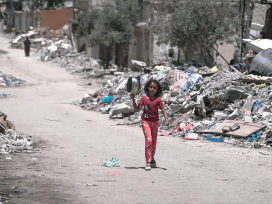Is this the new fascism?
The apathy and incoherence of the left are letting the Italian right have it all their own way and there are disastrous consequences in the offing, says Italy’s leading playwright
The new face of Italy is the face of apathy: no energy, no interest, no passion. What we are witnessing is a stream of acts of sheer folly and hypocrisy on the part of the various political groupings as they adjust to the overall climate of fascism, almost to the point where they are adopting its language and its behaviour. They trot out the same old litany of slogans: liberty, struggle, fatherland, Italy, defending the race, our civilisation’s culture, roots of our civilisation.
Added to this is what is being called ‘the conflict of interests’. Not even Mussolini ever actually adopted a policy of sharing out favours, neither for himself nor for those who accepted the logic of his regime (always excepting his choice of Fiat as the flagship of the nation’s industry). But nowadays we have Agnelli [the Agnelli Foundation established in 1966 by FIAT to celebrate the centenary of the birth of its founder, Senator Giovanni Agnelli] who spotted the way the wind was blowing and changed tack all of a sudden, as did the banks, the major finance houses and so on. And all that stands in their way is an absurd, timid nothingness, an opposition that scarcely seems to exist. Our role is simply to be dissidents attempting to make up for the absence of any political opposition. I saw what happened at the Social Democrats’ congress: it was as if they were paralysed. ‘We must change or we will die,’ they cried. And, having said that, they stood frozen like pillars of salt. When you see someone like Pierferdinando Casini, the president of the Chamber of Deputies, coming out with a statement that belongs directly to left-wing politics, such as: ‘Before we change anything in the RAI [state-owned TV channel] we have to resolve the conflict of interests,’ then you know the world’s gone mad.
Here is a right-wing politician co-opting the voice of a non-existent left. We are put in the absurd position of hearing Casini saying to his followers: ‘Steady on now, you’ve gone far enough.’ Even if it’s all sorted out afterwards with some sort of hypocritical gesture or in the end with nothing at all, it’s they, the right wing, that have managed to speak, not the opposition.
But there are signs of something new, especially amongst students and young workers, though also among older people too; the beginnings of movements that bear witness to a wonderful process of renewal.
But instead of greeting them with open arms, instead of offering them support or applauding their actions, the left runs away from them as if it found them repugnant. On the day of the great peace march against the war in Afghanistan, the left decided it preferred to go off on a barbecue, or wave little flags to cheer on the fleet as it left for the Far East. And let’s be clear: these are the same people who are responsible for the first moves to sell off state schools, despite the protests of teachers and others who rejected the transformation of schools into private businesses. Before we create a new kind of school, a private school, we should to do more to restore order to those we already have: the state schools.
And the same goes for their position on the war. Representatives of the centre-left, in an attempt to adopt a distinctive position, appealed for caution: ‘We must be careful; we must not harm civilians. We must try to avoid any damage or any injury to innocent people.’ We must be careful? It’s common knowledge now that 90 per cent of the victims were innocent.
It has been calculated that in three months of bombing there have been more than 3,000 known civilian casualties, at least as many as in the Twin Towers attack. And then there are the casualties in the towns that have suffered such terrible destruction, or the frightening number of invisible casualties, those whom Gino Strada calls ‘the invisible dead’: thousands of orphans whose parents were blown to pieces by bombing or by antipersonnel mines or unexploded bombs dropped from planes. It is estimated that it could take 200 years to clean up this huge area of land that has been desecrated with millions of mines.
But to return to Italy and the Paris meeting on the decline in democracy – a very evident phenomenon in my own country – at which I spoke. I would not want the fact that I have to go to Paris to make a speech calling for at least a minimum of reflection to be compared with what happened when that other absolutist government came into being, the one my father told me about. He became a political refugee in France while still very young. Even so, it is disturbing to hear those who lived through those times saying they feel as if they are reliving the 1920s, the years in which fascism was born.
All you have to do is read the newspapers to see how Silvio Berlusconi’s [President of the Council/prime minister] own lawyer dares to storm out of the courtroom yelling: ‘There’s no justice any more!’ Not to mention the advocates who support Berlusconi’s own lawyers in calling for the intervention of the justice minister and the Northern League, the Berlusconi government’s own watchdog.
What we’re faced with is the craziest of paradoxes, worthy of a surreal farce such as Ubu Roi: laws are being framed to suit the king, ministers are being appointed from among his courtiers and their sole function is to protect his interests. And what does the public do? It applauds. At best, someone does an indignant little burp to show that they’re finding it a bit hard to digest. All of which suggests that Il Cavaliere and his employees have a clear conscience when it comes to holding the reins of power with the knowledge they can act with complete impunity. They feel they’ve nothing to fear: ‘They’ll never pin anything on us.’ And all this is straight from the horse’s mouth. I heard a member of the government say when they were organising a meeting with the centre-left: ‘We’ll have an olive branch in one hand and a gun in the other.’ Those were his exact words.
It’s true. The new style fascism is already with us. It’s in their language, it’s in the way they express themselves, the way, first of all that they talk about Italy plc, about the Party as a limited company, so that everybody is a company employee with the big manager in the middle. ‘Væ victis!’ has always been a fascist slogan. Nowadays it’s all perfectly obvious from the body language, the words, the attitudes, the arrogance of these members of the ruling class who are given to thumping the table or to bellowing, ‘You’re getting on my nerves!’ or, ‘You’re sacked’ (as in the case of the minister for communications) or, ‘Arabs out!’ or, ‘They can go and build their sodding mosques somewhere else!’ or, ‘They can just stay in their ghettos!’ Well, there’s a new idea. Anybody who’s different, anybody who doesn’t conform – into the ghetto!
There are times when this state of affairs really gets to me, with a dull melancholy. It’s true that I go on working in the theatre, and it’s true that in our line of work we get the chance to take this kind of discourse to pieces. It’s true that audiences react; but these audiences are self-selecting. The most wonderful thing, despite it all, is this magnificent surge, this rising sun that illuminates the vision of the young people that we have to help, that we have to inform and to whom we must tell the truth.
But nowadays, in our country, we don’t have a Jean-Paul Sartre to go and say what he has to say in the universities as he did in 1968 when he gave a lecture about the theatre of situation, political theatre, the people’s theatre and concluded by quoting the words of Alberto Savinio: ‘Oh Men, recount your story!’
Today, the problem is not that of chronicling the present or recording the spirit of the age. Not only are most theatre producers and directors, thanks to a series of agile U-turns, more or less recent converts to the right, but the majority of intellectuals seem to be asleep, or pretending to be somewhere else, pretending to have other things to think about.
Published 24 May 2002
Original in Italian
Translated by
Mike Routledge (from French)
Contributed by Index on Censorship © Index on Censorship
PDF/PRINTNewsletter
Subscribe to know what’s worth thinking about.



